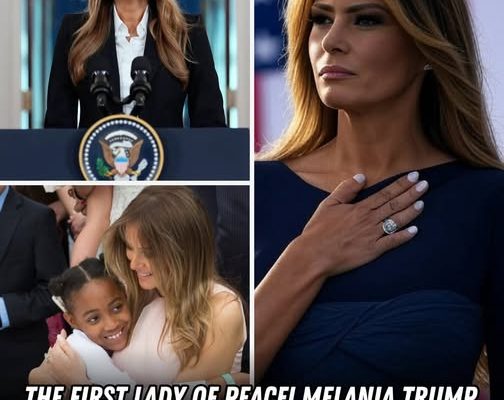Washington, D.C. — Former First Lady Melania Trump has announced a major humanitarian milestone: the successful reunification of eight Ukrainian children with their families, marking a hopeful step in her ongoing mission to support those affected by the war in Ukraine.
In a statement delivered Friday, Trump described the effort as “a continuation of compassion through action,” focusing on children who have been separated from their families due to the ongoing conflict.
“Each child has lived in turmoil because of the war in Ukraine,” Melania said. “Three were separated from their parents and displaced to the Russian Federation because of frontline fighting. The other five were separated from family members across borders because of the conflict.”
Her tone was calm but resolute. “My mission is twofold — to prioritize and optimize the free flow of health-related information surrounding all children who have fallen victim to this war, and to facilitate their reunification with their families until each individual returns home,” she continued.
The announcement highlights not only the deeply personal nature of her humanitarian work but also her evolving role as a bridge between diplomacy and compassion.
From Letter to Leverage
Friday’s milestone followed months of quiet diplomatic engagement that began with what many now call Melania’s “peace letter.” In August, she sent a handwritten appeal to Russian President Vladimir Putin, calling for the protection and reunification of Ukrainian children separated by war.
The letter was hand-delivered by former President Donald Trump during his summit with Putin in Alaska, an act described by observers as a rare moment of soft diplomacy amid tense geopolitical circumstances.
In the message, Melania urged the Russian leader to act “in the service of humanity itself” and to ensure that children caught between the two nations were returned safely to their families.
On Friday, she confirmed that Putin had responded directly in writing and expressed “a willingness to engage constructively” on the issue.
“My representative has been working directly with President Putin’s team to ensure the safe reunification of children with their families between Russia and Ukraine,” she revealed.
While government officials have yet to confirm the full details of these communications, Melania’s statement suggests that quiet, behind-the-scenes diplomacy has yielded tangible results — a rarity in today’s often polarized global environment.
Bridging Politics with Compassion
The initiative has already drawn international attention for its humanitarian focus and bipartisan support. Melania emphasized that her work “is part of an ongoing process,” with additional reunifications planned in the coming months.
“A child’s soul knows no borders, no flags,” she said. “We must foster a future for our children rich with potential, security, and free will — a world where dreams are realized rather than faded by war.”
Her appeal to shared humanity resonated beyond political boundaries. In a rare moment of cross-party unity, Sen. Amy Klobuchar (D-Minn.) and Sen. Chuck Grassley (R-Iowa) announced that the Abducted Ukrainian Children Recovery and Accountability Act had passed as part of the 2026 National Defense Authorization Act (NDAA). The legislation will create mechanisms to track, document, and recover thousands of Ukrainian children abducted or displaced during the war.
Klobuchar praised the effort, noting, “Every child deserves safety, identity, and family. This bipartisan measure is one step toward justice.”
Grassley echoed her sentiment, adding, “Protecting children is not a partisan cause — it’s a human one. We must continue to support families torn apart by war.”
Melania’s efforts, though independent of formal political channels, appear to align with broader humanitarian initiatives aimed at addressing the war’s most vulnerable victims.
A Quiet Form of Diplomacy

Over recent months, Melania Trump has increasingly been recognized for what some diplomats describe as “quiet influence” — a blend of empathy, restraint, and strategic communication.
Her approach contrasts sharply with the often high-profile gestures of traditional diplomacy. Instead of press conferences or official tours, she has chosen to work through letters, personal correspondence, and private negotiation, maintaining a low profile while focusing on measurable humanitarian outcomes.
Analysts note that her initiative represents a form of “moral diplomacy,” emphasizing shared values and human connection over political rhetoric.
“Melania Trump’s work underscores the idea that empathy can be a diplomatic tool,” said Dr. Eleanor Abrams, an international relations scholar at Georgetown University. “By focusing on children, she removes the political tension and appeals to universal compassion — something few public figures manage to achieve on this scale.”
The Human Impact
The eight Ukrainian children recently reunited with their families range in age from two to twelve. According to officials familiar with the effort, the reunifications took place across both Poland and Western Ukraine, coordinated through humanitarian partners and verified by family DNA records.
For many of these children, the journey home marks the end of years spent in displacement or institutional care. The details of their recovery remain confidential to protect their privacy, but Melania confirmed that the process was completed “with full cooperation from both humanitarian and medical experts.”
Observers say the milestone reflects a blend of perseverance, diplomacy, and genuine compassion. “It’s a story of hope,” said Dr. Abrams. “Every child brought home represents more than a victory — it’s a restoration of identity.”
Redefining Influence

Melania Trump’s recent public appearances have been limited, but her work behind the scenes has drawn increasing attention in both domestic and international media. To many, she has become a symbol of understated influence — someone using her platform not for publicity, but for purpose.
Her August letter to Putin, initially viewed as a symbolic act, now appears to have set in motion a practical humanitarian process. Analysts suggest this approach could serve as a model for “micro-diplomacy” — where individuals leverage moral authority rather than formal power to effect change.
“What began as a personal plea has evolved into a credible diplomatic channel,” said Abrams. “It shows that influence doesn’t have to come from political office — it can come from persistence and humanity.”
A Vision Rooted in Empathy
As she concluded her announcement, Melania Trump reflected on what motivates her to continue this mission. “I hope peace will come soon,” she said. “And peace can begin with our children.”
The words, simple yet profound, encapsulate her evolving legacy — one defined not by political noise but by quiet conviction. Behind her polished public image lies a woman committed to turning empathy into action, bridging divides where others see only distance.
Her journey — from sending a letter to achieving real-world results — demonstrates that diplomacy can still be driven by compassion. And while the world continues to grapple with the broader consequences of war, Melania Trump’s humanitarian message serves as a reminder that sometimes the most powerful gestures are not broadcast on the world stage but written in sincerity and delivered with purpose.
As the first eight reunifications are celebrated, her work continues — quietly, steadily, and with hope that more families will soon find their way back together.




